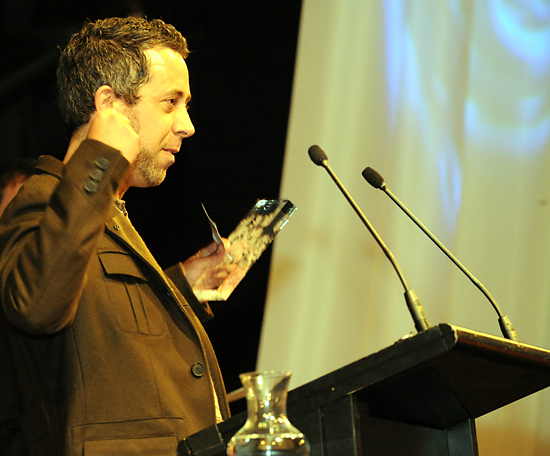On Friday night I was the proud recipient of an ONYA – awarded to this website for ‘Best content (personal)’.
The other finalists in the category were Alison Green of WebWeaver for The Gathering Archives, and Jared Gulian for Moon over Martinborough. Sorry guys!
What makes the ONYAs so special is that the judging panel was a team of top web professionals – Alex Wright (NY Times), Brian Fling (pinch/zoom), Bek Hodgson (Etsy), Thomas Fuchs and Amy Hoy (slash7), Russ Weakley (Max Design), Rachel McAlpine (Contented), Donna Spencer (Maadmob) and Jason Ryan (State Services Commission) – woah!
A little bit of history…
 This website first went public in June 1995 as the result of a major project for my degree in Broadcasting and Communications.
This website first went public in June 1995 as the result of a major project for my degree in Broadcasting and Communications.
I chose ‘the web’ – over a project grounded in radio, television or film – as I saw the amazing potential it had in store as a broadcasting (or what I then called ‘narrowcasting’) medium.
The paper was entitled “Zef’s Exploration into the World Wide Web’ and is an interesting insight to the dawn of the modern internet we all know well today.
I then wrote:
“…I’ve come to believe that it (the internet) could be regarded as a life-force all of its own. Not of the ‘artificial intelligence’ sort that clogs science fiction novels, but an organic intelligence, sourced purely from ‘in the flesh’ internet creators, users and players themselves – human-kind”.
Looking back, I guess I was hinting at ‘Social Media’?
So, the birth of this website was a music e-zine (entitled ‘Global Groove’) and it has essentially remained as an online magazine ever since. In its heyday this site was drawing so much overseas traffic it would frequently overload the bandwidth entering Dunedin and would be unceremoniously cut-off!
Had I been more entrepreneurial I would have realised this was actually an opportunity, not a hindrance.
Oh well.
Related blog: When the Web Was Young
And now…
My website, in its current form, is about sharing my ideas, thoughts and experiences as a web industry professional.
This partially came about through my frustration of the ‘wall of silence’ which, sadly, used to surround many of my peers and the web industry as a whole in the early 2000s.
In my experience, knowledge-sharing back then was uncommon. In fact, withholding knowledge was actually used by some as some sort of power-trip.
So when I branched into User Experience I was, in most cases, forced to look overseas for inspiration…
I owe a lot to Jared Spool’s UIE newsletter (back then it was sent to me, on paper!), Jakob Nielsen’s Alertbox, Alan Cooper’s book ‘About Face’, and Lou Rosenfeld & Peter Morville for their book ‘Information Architecture for the World Wide Web‘.
As you know, I’m not the type to sit on that exciting pool of knowledge. I believe that by sharing what I know and what I’m working on, it helps to make my local web industry better and stronger.
Today, it’s really great to see that the User Experience community in this country is one of relative openness and healthy discussion. I’ve learnt a lot from my colleagues in recent years – including those I’ve trained and mentored, who, in turn, have inspired and taught me as well.
Without openness much of the content on my blog would not be possible, so I would like to acknowledge the following people who have helped make this website an ONYAs success…
Colin Phillips and Emma Martin: Some of the people in the early days who did share their knowledge and ideas!
Mason Pratt, Provoke Solutions: My employer from 2004- 2008. He allowed me to write about client work and share insights to the Provoke User Experience team.
Emily Loughnan, Clicksuite: My current employer, who shares my belief that sharing ideas is a good thing!
The User Experience community: You should know who you are!
My 1001 regular subscribers: I wish you would comment more but I know you’re out there! The statistics don’t lie!
What’s in store…
Life is a bit crazy for me right now, but when I have time again I’ve been thinking of a project I’d love your help with.
It’ll involve understanding our own industry better – ever tried creating personas for the (types of) people you work with every day?
That’s a big clue.
Stay posted…

You must be logged in to post a comment.